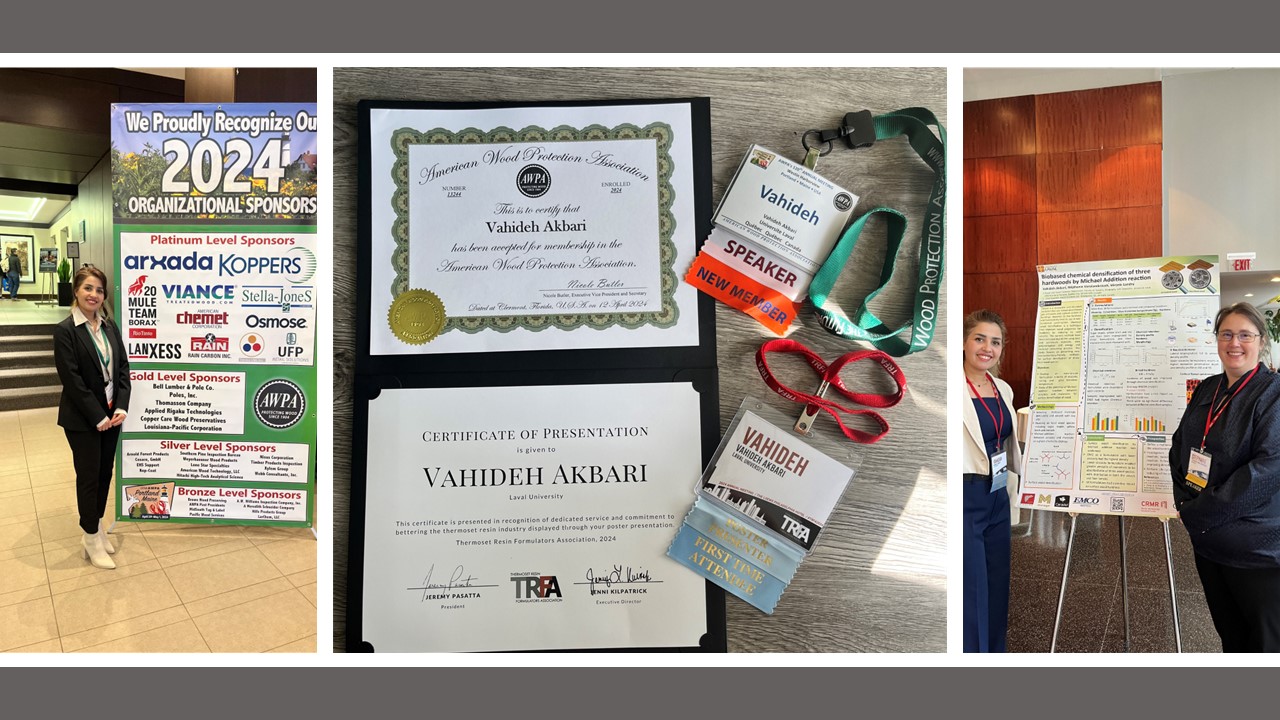Participation of Vahideh Akbari at the « AWPA’s 120th Annual Meeting » and « 2024 TRFA Annual Meeting »!
Vahideh Akbari, a PhD student in wood and bio-based materials engineering, recently had the opportunity to take part in two major events: « AWPA’s 120th Annual Meeting » and the « Thermoset Resin Formulators Association (TRFA) 2024 Annual Meeting », to present the results of her research project entitled « Development of innovative wood hardening solutions ».
Well done Vahideh! It was an excellent opportunity to share her results, broaden her skills, and develop her network of contacts. Vahideh works under the direction of Véronic Landry and Stéphanie Vanslambrouck, at the NSERC – Canlak Industrial Research Chair in Finishes for Interior Wood Products.
Thanks to the US$1,300 « American Wood Protection Association Student Travel Grant » she won, Vahideh was able to present an oral communication entitled « Environmentally Friendly Wood Innovative Hardening Solution » at AWPA’s 120th Annual Meeting in Portland, USA, held from April 29 to May 2. This opportunity enabled Vahideh to share her findings and scientific advances with an international audience of peers and industry professionals, broadening her areas of expertise.
At the « TRFA 2024 Annual Meeting », held May 6-9, 2024 in Philadelphia, USA, Vahideh also presented a scientific poster entitled « Biobased Chemical Densification of Three Hardwoods through Michael Addition Reaction ».
Congratulations to Vahideh on this achievement! We wish her every success and prosperity in her academic and professional career.

ABSTRACT
The construction sector is a major contributor to global greenhouse gas emissions, accounting for 40% of the total, with building materials and construction alone responsible for 10% of these emissions [1]. This trend is expected to grow significantly by 2030. To address these environmental concerns, the adoption of green materials, particularly wood products, offers a promising solution to reduce energy consumption and carbon emissions in construction.
Wood, commonly used in residential buildings (71% market share), faces limitations in non-residential structures due to hardness and flammability concerns [2]. Wood densification, a technique aimed at enhancing wood density and hardness, presents a promising solution for expanding wood’s use across various applications [3,4]. Current densification methods, however, have limitations in terms of cost and environmental impact [5]. This project introduces an environmentally friendly approach involving in-situ polymerization using Michael-addition reaction between biobased acrylate and malonate monomers. This reaction, conducted in mild conditions with reducing energy and solvent consumptions, aims to enhance wood densification while minimizing environmental impact.
Various malonate-acrylate systems are formulated, optimized, and tested on three different North American hardwoods. The study aims to advance sustainable wood-polymer composites to enhance wood properties, particularly hardness and potentially reducing greenhouse gas emissions associated with the sector.
References:
[1] Global Status Report (2021). Available at: https://architecture2030.org/why-the-building-sector/.
[2] Robichaud, F., R. Kozak, A. Richelieu. 2009. Wood use in nonresidential construction: A case for communication with architects. Forest Products Journal, 52 (1/2):57-65. https://link.gale.com/apps/doc/A195919095/AONE?u=googlescholar&sid=bookmark-AONE&xid=ee81d8ca.
[3] Petric, M., Surface modification of wood: a critical review. Reviews of Adhesion and Adhesives, 2013. 1(2): p. 216-47. https://doi.org/10.7569/RAA.2013.097308.
[4] Kutnar A, Sernek M (2007) Wood densification. Zbornik gozdarstva in lesarstva 82:53–62. http://eprints.gozdis.si/id/eprint/198.
[5] Laine K, Segerholm K, Wa˚linder M et al (2016) Wood densification and thermal modification: hardness, set-recovery and micromorphology. Wood Sci Technol 50:883–89. https://doi.org/10.1007/s00226-016-0835-z.

